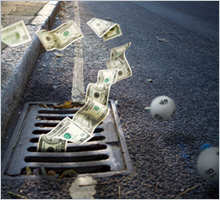How Not to Win the Lottery or Common Mistakes of Lottery Players

As a young person you dream about traveling the world, seeing extraordinary places and eating exotic food. You study, start working and, along with your first paycheck, comes the realization that you will never be able to do all that on your own. In your despair, you turn to the lottery; a get-rich-quick ticket to financial freedom. And even though you have played the lottery a dozen times, you are still no better off than when you first circled your lucky numbers. In an effort to portray everything that has been my downfall, according to the people who have done research on lottery systems, this is why I have not yet won the lottery.
Playing all odd or all even numbers
Those who have done the mathematical calculations and statistics have found that the vast majority of drawings has some mixture of odd and even numbers. No wonder my philosophy of bad week, odd numbers and good week, even numbers haven’t worked.
Playing all high or all low numbers
If you, like me, make a habit of using birthdays as a number reference for playing the lottery, you too may not yet have succeeded in becoming a millionaire. Seeing as most of the birthdays in my family fall under the number 23, I have very seldom played high numbers and stand only a 3% or so chance of winning with my current combinations. The only solutions are changing to a 90 day month system or forgoing the birthdates of my favorite people.
Not paying attention to trends in number groups
More often than not a number group, for example the 20s, is not represented in every draw. This, unfortunately, is information of very little use to me as the only statistics I am capable of is tracking my daily coffee to water ratio.
Never tracking numbers
According to specialists in the field, even random number draws follow predictable, albeit obscure patterns. The number of times a number has been skipped in winning draws can help you determine when you should play that number again. Once again, you might want to consult someone who specializes in trends and statistics rather than the mathematically challenged person writing this article.
Not playing a balanced game
If a lottery consists of six numbers, make sure that the numbers you choose add up to between 115 and 185. Trends in the South African Lottery suggest that more than 70% of winning combinations follow this rule.
Trying to be selfish and keeping everything to yourself
While forming a lottery club might mean that you would have to share your winnings if you do have the winning ticket, it may also mean that you get a share of somebody else’s money when they win too. There are various ways to go about it; you each may make turns buying a ticket or each of your purchases a ticket for every draw. Either way, by pooling your resources and number combinations you all stand a better chance of walking away with more money than you started off with, even if it is a few thousand rather than a million.
Using previous winning combinations
For a while I tried drawing from the success of others by using winning number combinations that had been drawn before. In retrospect that was a bad idea as research has shown specific number sets are unlikely to be repeated in a single lifetime. With lottery numbers, as with so many other things, originality has its place.
Using consecutive numbers
This does not happen. Ever. Well, seldom enough not to warrant you ever doing it yourself. 1,2,3,4,5,6 falls into this category and as the most played number combination, so many people are wasting a good chance for fortune.
Drawing little pictures on your number card
I am guilty as charged. I, too, have made the mistake of drawing a flower, crooked heart or just a zigzag pattern when no specific numbers come to mind. Just remember that if you have done it, it is extremely likely that one the thousands of other people playing also made use of that pattern, forcing you to share any money you might have won.
Using superstitious number features
Along with all the other information mentioned above, making use of number multiples or numbers ending with the same last digit are also a bad idea and occur very seldom in random drawings.
Although my research has shed light on why I am still writing about faraway places instead of experiencing them myself, I have not yet given up hope that I may still win the lottery. I just have better strategies in place now for doing so. All that is left to do is plan how I am going to spend my first million and then find a friend to share it with. What use is money after all, if we do not have loved ones to share it with? And while softening the heart of Lady Luck might not be on the list, it certainly cannot do any harm…